Melbourne vs Sydney: Management Theory and Practice Report
VerifiedAdded on 2021/04/21
|10
|1559
|46
Report
AI Summary
This report provides a comparative analysis of management theory and practice, focusing on two universities: Melbourne and Sydney. The student examines the universities' purposes, opportunities, and approaches to effective learning, using the ALTC criteria as a key evaluation tool. The report assesses the effectiveness of the organizations by evaluating the learning process and methodology of stakeholder groups. The student analyzes the outcomes of multiple stakeholders and the implications for developing a coherent approach to organizational effectiveness. The report highlights the universities' strengths in terms of responsibility, offering knowledge, and research opportunities, while also suggesting areas for improvement in the context of evolving educational frameworks and stakeholder expectations. The analysis includes references to relevant literature and research to support the findings.
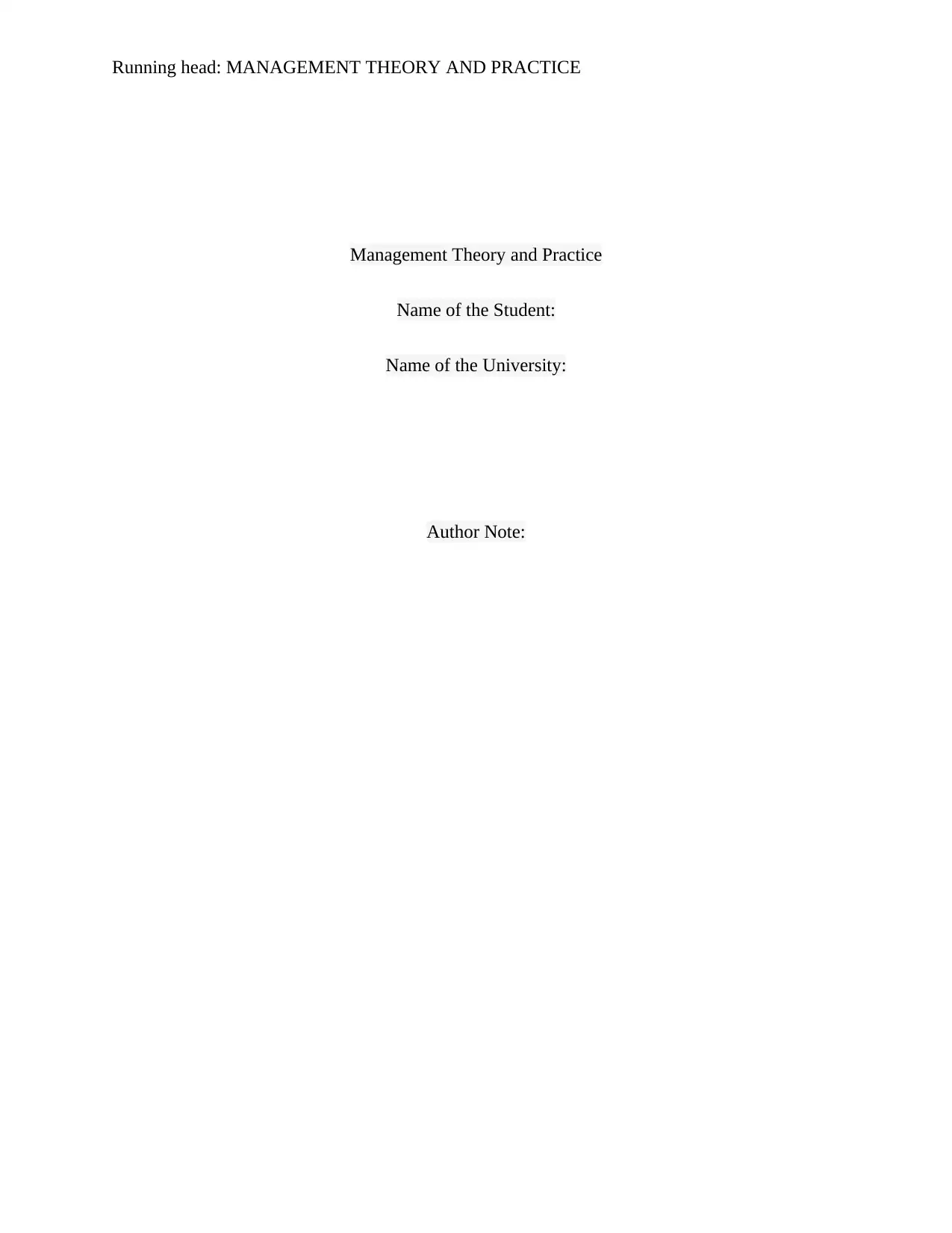
Running head: MANAGEMENT THEORY AND PRACTICE
Management Theory and Practice
Name of the Student:
Name of the University:
Author Note:
Management Theory and Practice
Name of the Student:
Name of the University:
Author Note:
Paraphrase This Document
Need a fresh take? Get an instant paraphrase of this document with our AI Paraphraser
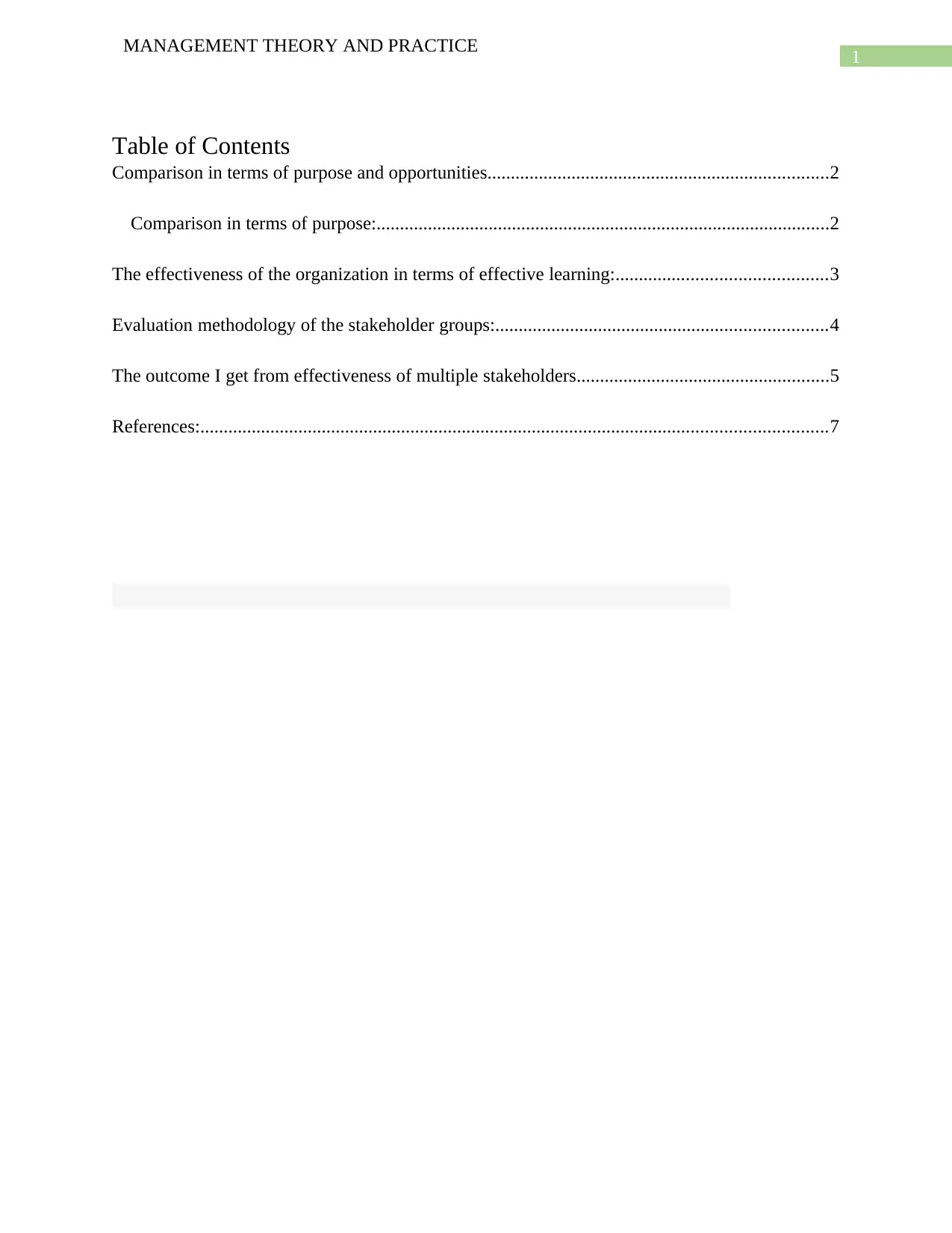
1
MANAGEMENT THEORY AND PRACTICE
Table of Contents
Comparison in terms of purpose and opportunities.........................................................................2
Comparison in terms of purpose:.................................................................................................2
The effectiveness of the organization in terms of effective learning:.............................................3
Evaluation methodology of the stakeholder groups:.......................................................................4
The outcome I get from effectiveness of multiple stakeholders......................................................5
References:......................................................................................................................................7
MANAGEMENT THEORY AND PRACTICE
Table of Contents
Comparison in terms of purpose and opportunities.........................................................................2
Comparison in terms of purpose:.................................................................................................2
The effectiveness of the organization in terms of effective learning:.............................................3
Evaluation methodology of the stakeholder groups:.......................................................................4
The outcome I get from effectiveness of multiple stakeholders......................................................5
References:......................................................................................................................................7
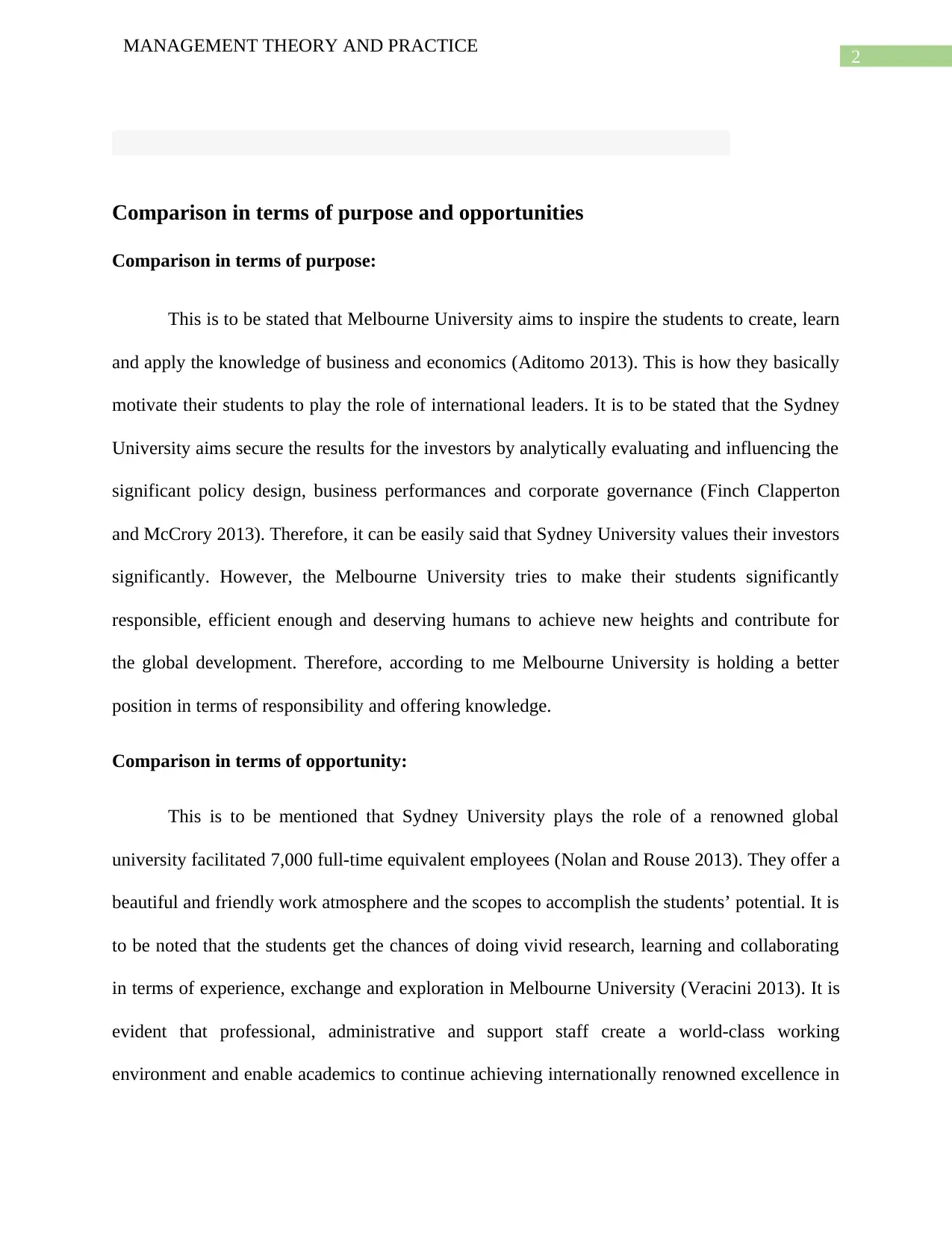
2
MANAGEMENT THEORY AND PRACTICE
Comparison in terms of purpose and opportunities
Comparison in terms of purpose:
This is to be stated that Melbourne University aims to inspire the students to create, learn
and apply the knowledge of business and economics (Aditomo 2013). This is how they basically
motivate their students to play the role of international leaders. It is to be stated that the Sydney
University aims secure the results for the investors by analytically evaluating and influencing the
significant policy design, business performances and corporate governance (Finch Clapperton
and McCrory 2013). Therefore, it can be easily said that Sydney University values their investors
significantly. However, the Melbourne University tries to make their students significantly
responsible, efficient enough and deserving humans to achieve new heights and contribute for
the global development. Therefore, according to me Melbourne University is holding a better
position in terms of responsibility and offering knowledge.
Comparison in terms of opportunity:
This is to be mentioned that Sydney University plays the role of a renowned global
university facilitated 7,000 full-time equivalent employees (Nolan and Rouse 2013). They offer a
beautiful and friendly work atmosphere and the scopes to accomplish the students’ potential. It is
to be noted that the students get the chances of doing vivid research, learning and collaborating
in terms of experience, exchange and exploration in Melbourne University (Veracini 2013). It is
evident that professional, administrative and support staff create a world-class working
environment and enable academics to continue achieving internationally renowned excellence in
MANAGEMENT THEORY AND PRACTICE
Comparison in terms of purpose and opportunities
Comparison in terms of purpose:
This is to be stated that Melbourne University aims to inspire the students to create, learn
and apply the knowledge of business and economics (Aditomo 2013). This is how they basically
motivate their students to play the role of international leaders. It is to be stated that the Sydney
University aims secure the results for the investors by analytically evaluating and influencing the
significant policy design, business performances and corporate governance (Finch Clapperton
and McCrory 2013). Therefore, it can be easily said that Sydney University values their investors
significantly. However, the Melbourne University tries to make their students significantly
responsible, efficient enough and deserving humans to achieve new heights and contribute for
the global development. Therefore, according to me Melbourne University is holding a better
position in terms of responsibility and offering knowledge.
Comparison in terms of opportunity:
This is to be mentioned that Sydney University plays the role of a renowned global
university facilitated 7,000 full-time equivalent employees (Nolan and Rouse 2013). They offer a
beautiful and friendly work atmosphere and the scopes to accomplish the students’ potential. It is
to be noted that the students get the chances of doing vivid research, learning and collaborating
in terms of experience, exchange and exploration in Melbourne University (Veracini 2013). It is
evident that professional, administrative and support staff create a world-class working
environment and enable academics to continue achieving internationally renowned excellence in
⊘ This is a preview!⊘
Do you want full access?
Subscribe today to unlock all pages.

Trusted by 1+ million students worldwide
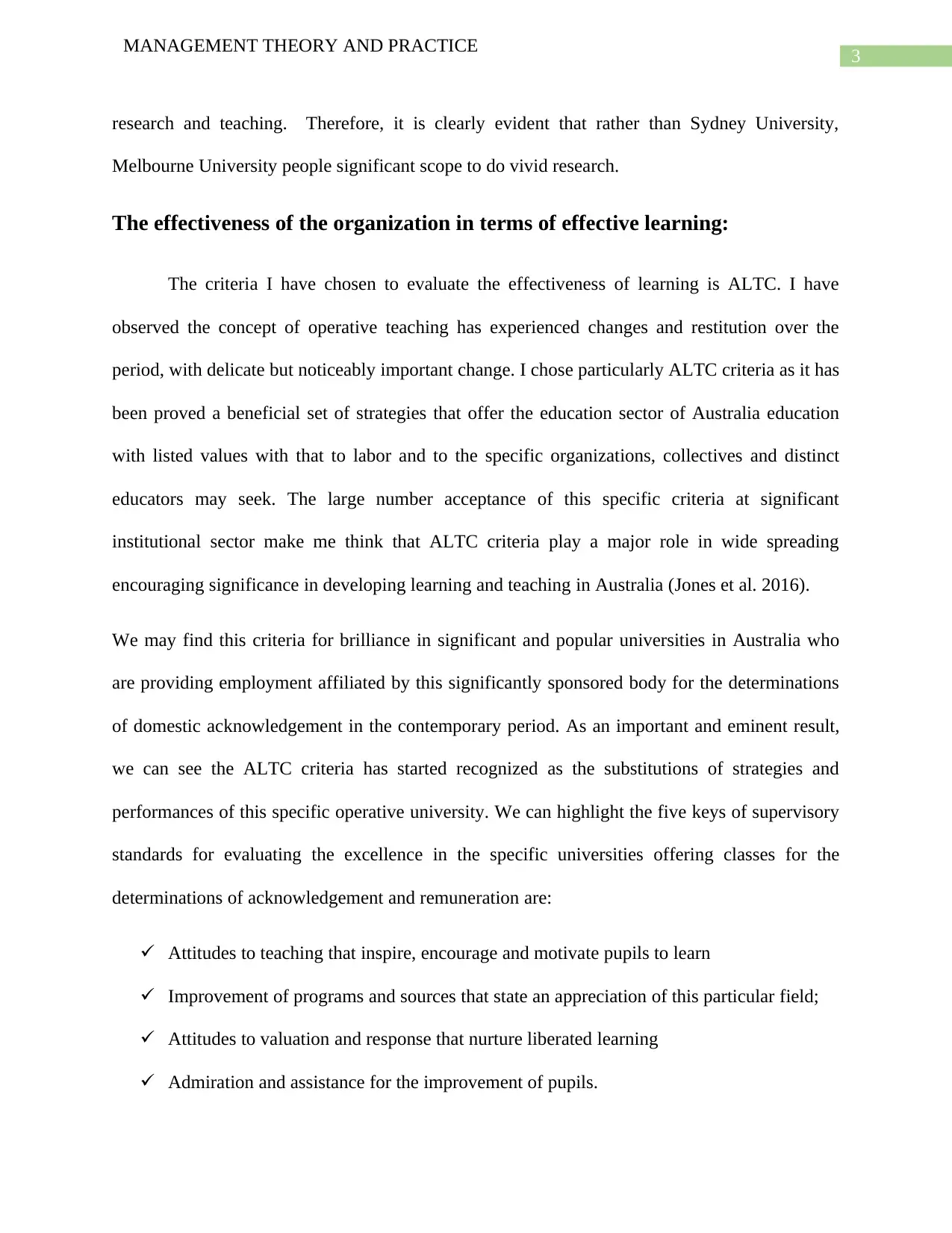
3
MANAGEMENT THEORY AND PRACTICE
research and teaching. Therefore, it is clearly evident that rather than Sydney University,
Melbourne University people significant scope to do vivid research.
The effectiveness of the organization in terms of effective learning:
The criteria I have chosen to evaluate the effectiveness of learning is ALTC. I have
observed the concept of operative teaching has experienced changes and restitution over the
period, with delicate but noticeably important change. I chose particularly ALTC criteria as it has
been proved a beneficial set of strategies that offer the education sector of Australia education
with listed values with that to labor and to the specific organizations, collectives and distinct
educators may seek. The large number acceptance of this specific criteria at significant
institutional sector make me think that ALTC criteria play a major role in wide spreading
encouraging significance in developing learning and teaching in Australia (Jones et al. 2016).
We may find this criteria for brilliance in significant and popular universities in Australia who
are providing employment affiliated by this significantly sponsored body for the determinations
of domestic acknowledgement in the contemporary period. As an important and eminent result,
we can see the ALTC criteria has started recognized as the substitutions of strategies and
performances of this specific operative university. We can highlight the five keys of supervisory
standards for evaluating the excellence in the specific universities offering classes for the
determinations of acknowledgement and remuneration are:
Attitudes to teaching that inspire, encourage and motivate pupils to learn
Improvement of programs and sources that state an appreciation of this particular field;
Attitudes to valuation and response that nurture liberated learning
Admiration and assistance for the improvement of pupils.
MANAGEMENT THEORY AND PRACTICE
research and teaching. Therefore, it is clearly evident that rather than Sydney University,
Melbourne University people significant scope to do vivid research.
The effectiveness of the organization in terms of effective learning:
The criteria I have chosen to evaluate the effectiveness of learning is ALTC. I have
observed the concept of operative teaching has experienced changes and restitution over the
period, with delicate but noticeably important change. I chose particularly ALTC criteria as it has
been proved a beneficial set of strategies that offer the education sector of Australia education
with listed values with that to labor and to the specific organizations, collectives and distinct
educators may seek. The large number acceptance of this specific criteria at significant
institutional sector make me think that ALTC criteria play a major role in wide spreading
encouraging significance in developing learning and teaching in Australia (Jones et al. 2016).
We may find this criteria for brilliance in significant and popular universities in Australia who
are providing employment affiliated by this significantly sponsored body for the determinations
of domestic acknowledgement in the contemporary period. As an important and eminent result,
we can see the ALTC criteria has started recognized as the substitutions of strategies and
performances of this specific operative university. We can highlight the five keys of supervisory
standards for evaluating the excellence in the specific universities offering classes for the
determinations of acknowledgement and remuneration are:
Attitudes to teaching that inspire, encourage and motivate pupils to learn
Improvement of programs and sources that state an appreciation of this particular field;
Attitudes to valuation and response that nurture liberated learning
Admiration and assistance for the improvement of pupils.
Paraphrase This Document
Need a fresh take? Get an instant paraphrase of this document with our AI Paraphraser
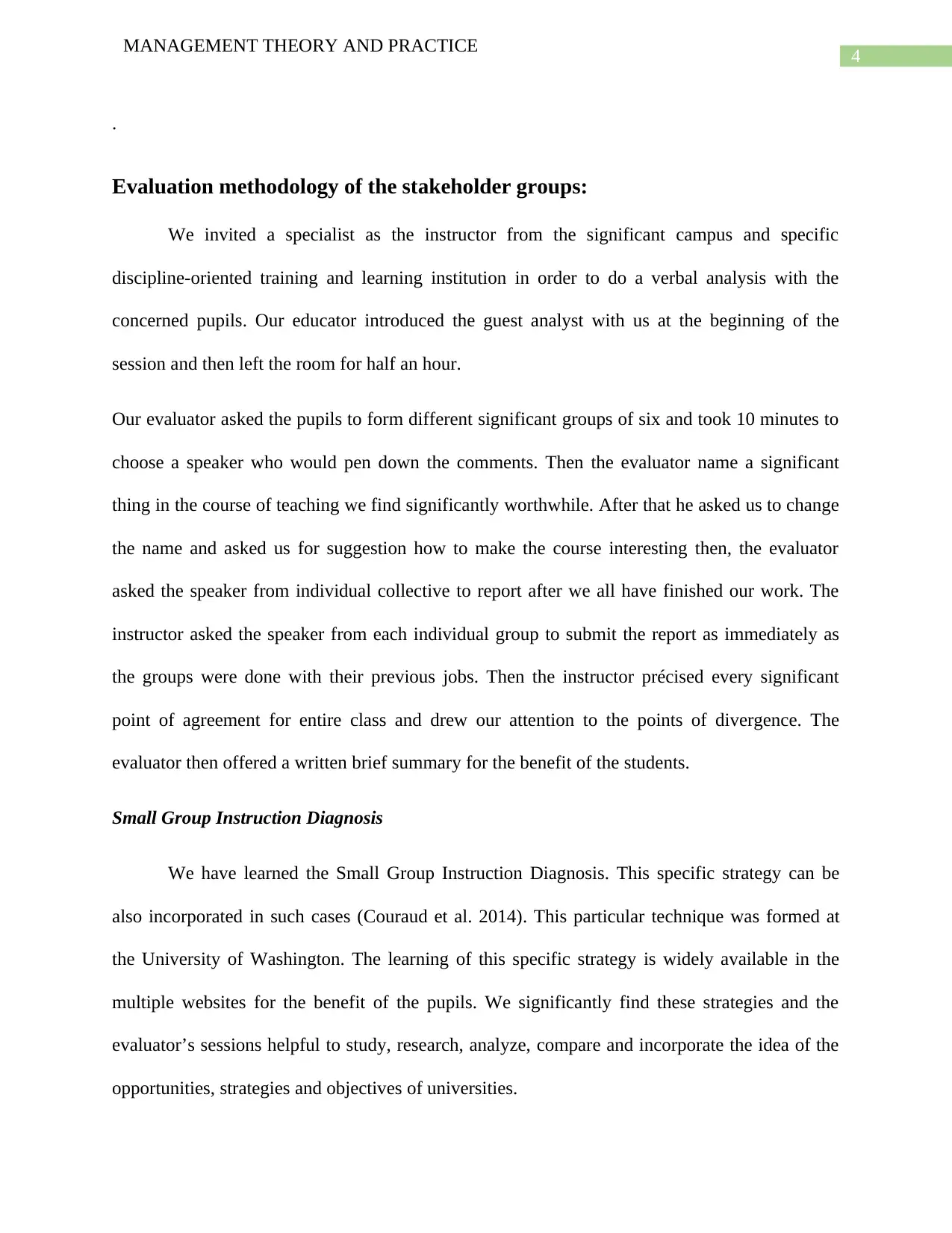
4
MANAGEMENT THEORY AND PRACTICE
.
Evaluation methodology of the stakeholder groups:
We invited a specialist as the instructor from the significant campus and specific
discipline-oriented training and learning institution in order to do a verbal analysis with the
concerned pupils. Our educator introduced the guest analyst with us at the beginning of the
session and then left the room for half an hour.
Our evaluator asked the pupils to form different significant groups of six and took 10 minutes to
choose a speaker who would pen down the comments. Then the evaluator name a significant
thing in the course of teaching we find significantly worthwhile. After that he asked us to change
the name and asked us for suggestion how to make the course interesting then, the evaluator
asked the speaker from individual collective to report after we all have finished our work. The
instructor asked the speaker from each individual group to submit the report as immediately as
the groups were done with their previous jobs. Then the instructor précised every significant
point of agreement for entire class and drew our attention to the points of divergence. The
evaluator then offered a written brief summary for the benefit of the students.
Small Group Instruction Diagnosis
We have learned the Small Group Instruction Diagnosis. This specific strategy can be
also incorporated in such cases (Couraud et al. 2014). This particular technique was formed at
the University of Washington. The learning of this specific strategy is widely available in the
multiple websites for the benefit of the pupils. We significantly find these strategies and the
evaluator’s sessions helpful to study, research, analyze, compare and incorporate the idea of the
opportunities, strategies and objectives of universities.
MANAGEMENT THEORY AND PRACTICE
.
Evaluation methodology of the stakeholder groups:
We invited a specialist as the instructor from the significant campus and specific
discipline-oriented training and learning institution in order to do a verbal analysis with the
concerned pupils. Our educator introduced the guest analyst with us at the beginning of the
session and then left the room for half an hour.
Our evaluator asked the pupils to form different significant groups of six and took 10 minutes to
choose a speaker who would pen down the comments. Then the evaluator name a significant
thing in the course of teaching we find significantly worthwhile. After that he asked us to change
the name and asked us for suggestion how to make the course interesting then, the evaluator
asked the speaker from individual collective to report after we all have finished our work. The
instructor asked the speaker from each individual group to submit the report as immediately as
the groups were done with their previous jobs. Then the instructor précised every significant
point of agreement for entire class and drew our attention to the points of divergence. The
evaluator then offered a written brief summary for the benefit of the students.
Small Group Instruction Diagnosis
We have learned the Small Group Instruction Diagnosis. This specific strategy can be
also incorporated in such cases (Couraud et al. 2014). This particular technique was formed at
the University of Washington. The learning of this specific strategy is widely available in the
multiple websites for the benefit of the pupils. We significantly find these strategies and the
evaluator’s sessions helpful to study, research, analyze, compare and incorporate the idea of the
opportunities, strategies and objectives of universities.
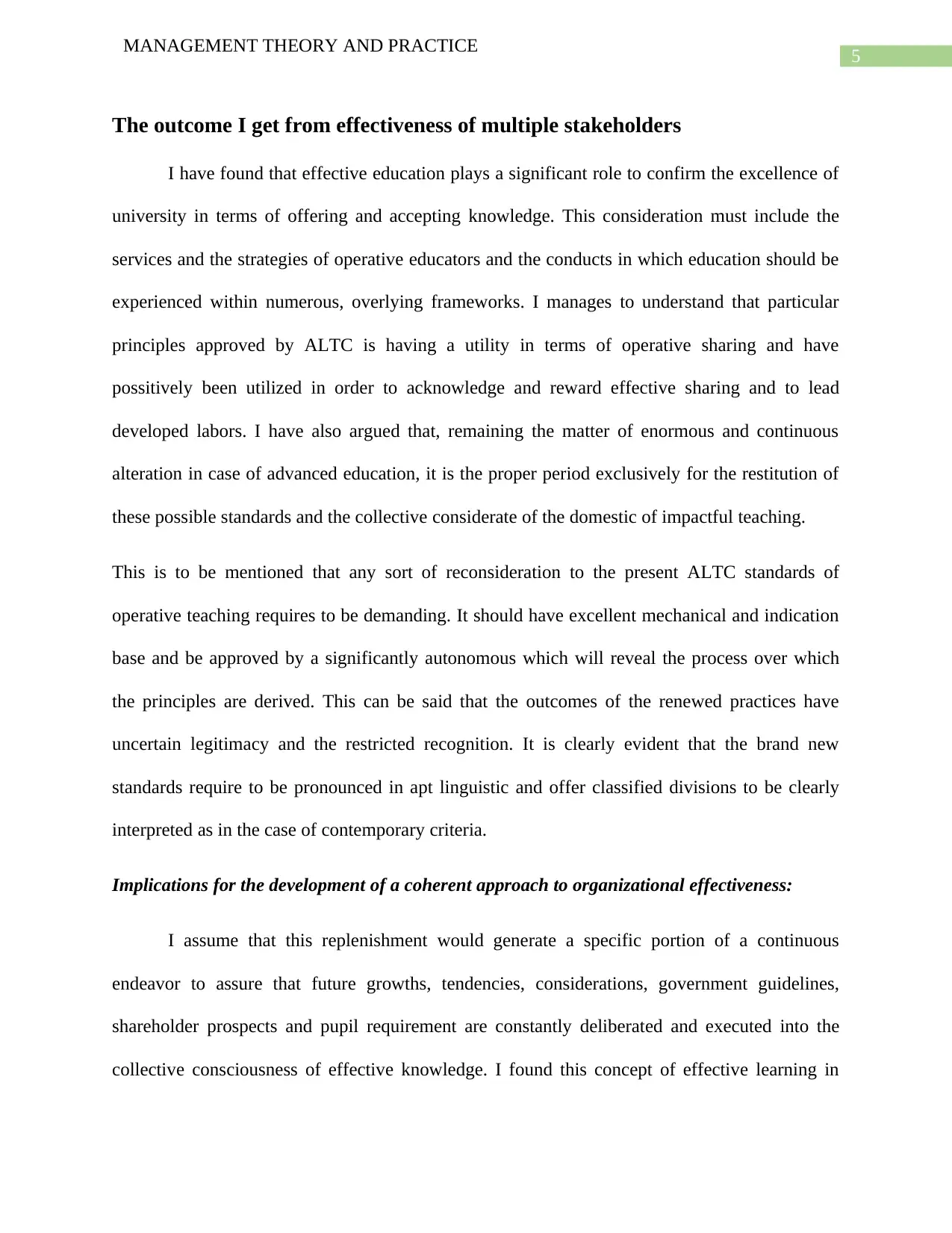
5
MANAGEMENT THEORY AND PRACTICE
The outcome I get from effectiveness of multiple stakeholders
I have found that effective education plays a significant role to confirm the excellence of
university in terms of offering and accepting knowledge. This consideration must include the
services and the strategies of operative educators and the conducts in which education should be
experienced within numerous, overlying frameworks. I manages to understand that particular
principles approved by ALTC is having a utility in terms of operative sharing and have
possitively been utilized in order to acknowledge and reward effective sharing and to lead
developed labors. I have also argued that, remaining the matter of enormous and continuous
alteration in case of advanced education, it is the proper period exclusively for the restitution of
these possible standards and the collective considerate of the domestic of impactful teaching.
This is to be mentioned that any sort of reconsideration to the present ALTC standards of
operative teaching requires to be demanding. It should have excellent mechanical and indication
base and be approved by a significantly autonomous which will reveal the process over which
the principles are derived. This can be said that the outcomes of the renewed practices have
uncertain legitimacy and the restricted recognition. It is clearly evident that the brand new
standards require to be pronounced in apt linguistic and offer classified divisions to be clearly
interpreted as in the case of contemporary criteria.
Implications for the development of a coherent approach to organizational effectiveness:
I assume that this replenishment would generate a specific portion of a continuous
endeavor to assure that future growths, tendencies, considerations, government guidelines,
shareholder prospects and pupil requirement are constantly deliberated and executed into the
collective consciousness of effective knowledge. I found this concept of effective learning in
MANAGEMENT THEORY AND PRACTICE
The outcome I get from effectiveness of multiple stakeholders
I have found that effective education plays a significant role to confirm the excellence of
university in terms of offering and accepting knowledge. This consideration must include the
services and the strategies of operative educators and the conducts in which education should be
experienced within numerous, overlying frameworks. I manages to understand that particular
principles approved by ALTC is having a utility in terms of operative sharing and have
possitively been utilized in order to acknowledge and reward effective sharing and to lead
developed labors. I have also argued that, remaining the matter of enormous and continuous
alteration in case of advanced education, it is the proper period exclusively for the restitution of
these possible standards and the collective considerate of the domestic of impactful teaching.
This is to be mentioned that any sort of reconsideration to the present ALTC standards of
operative teaching requires to be demanding. It should have excellent mechanical and indication
base and be approved by a significantly autonomous which will reveal the process over which
the principles are derived. This can be said that the outcomes of the renewed practices have
uncertain legitimacy and the restricted recognition. It is clearly evident that the brand new
standards require to be pronounced in apt linguistic and offer classified divisions to be clearly
interpreted as in the case of contemporary criteria.
Implications for the development of a coherent approach to organizational effectiveness:
I assume that this replenishment would generate a specific portion of a continuous
endeavor to assure that future growths, tendencies, considerations, government guidelines,
shareholder prospects and pupil requirement are constantly deliberated and executed into the
collective consciousness of effective knowledge. I found this concept of effective learning in
⊘ This is a preview!⊘
Do you want full access?
Subscribe today to unlock all pages.

Trusted by 1+ million students worldwide
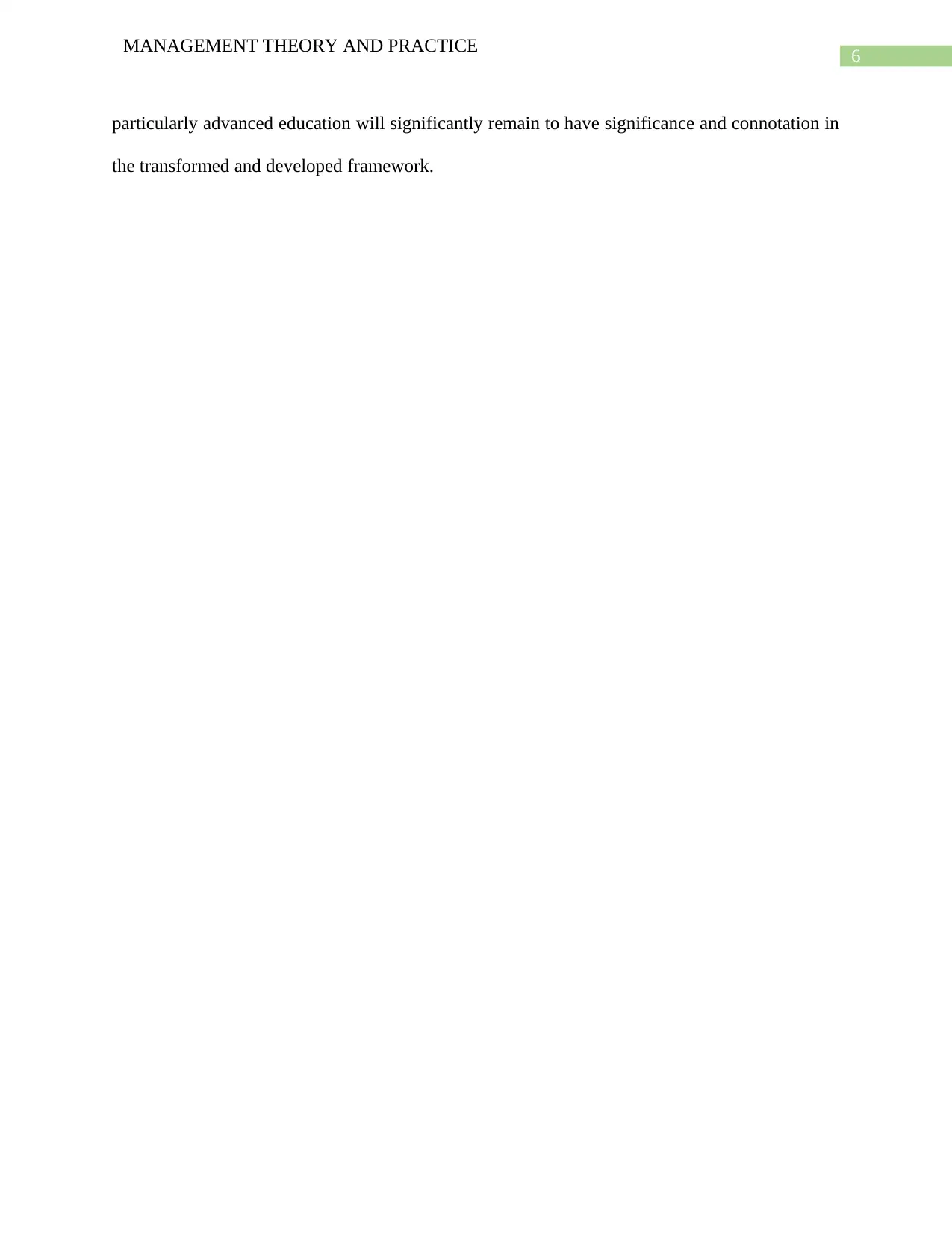
6
MANAGEMENT THEORY AND PRACTICE
particularly advanced education will significantly remain to have significance and connotation in
the transformed and developed framework.
MANAGEMENT THEORY AND PRACTICE
particularly advanced education will significantly remain to have significance and connotation in
the transformed and developed framework.
Paraphrase This Document
Need a fresh take? Get an instant paraphrase of this document with our AI Paraphraser
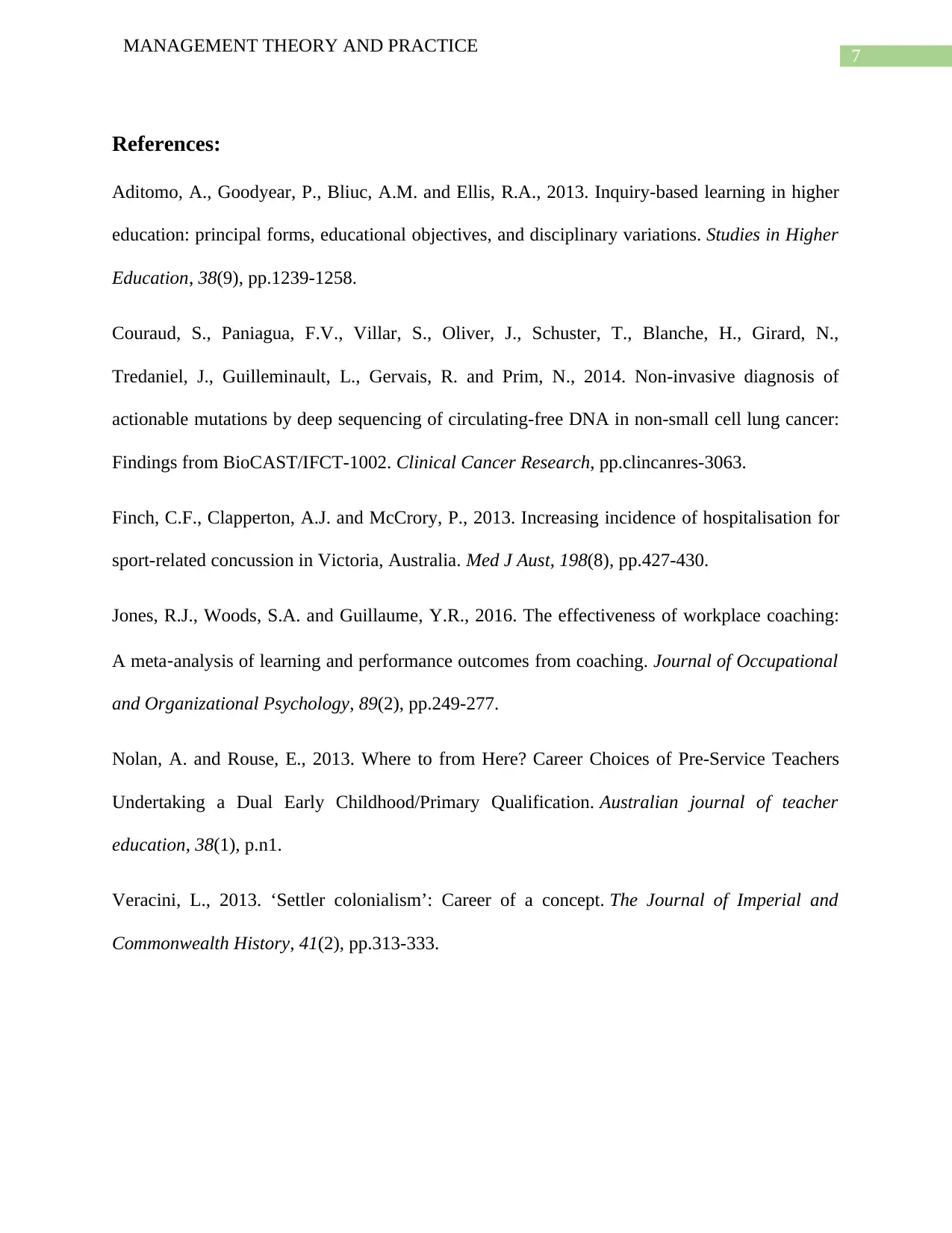
7
MANAGEMENT THEORY AND PRACTICE
References:
Aditomo, A., Goodyear, P., Bliuc, A.M. and Ellis, R.A., 2013. Inquiry-based learning in higher
education: principal forms, educational objectives, and disciplinary variations. Studies in Higher
Education, 38(9), pp.1239-1258.
Couraud, S., Paniagua, F.V., Villar, S., Oliver, J., Schuster, T., Blanche, H., Girard, N.,
Tredaniel, J., Guilleminault, L., Gervais, R. and Prim, N., 2014. Non-invasive diagnosis of
actionable mutations by deep sequencing of circulating-free DNA in non-small cell lung cancer:
Findings from BioCAST/IFCT-1002. Clinical Cancer Research, pp.clincanres-3063.
Finch, C.F., Clapperton, A.J. and McCrory, P., 2013. Increasing incidence of hospitalisation for
sport-related concussion in Victoria, Australia. Med J Aust, 198(8), pp.427-430.
Jones, R.J., Woods, S.A. and Guillaume, Y.R., 2016. The effectiveness of workplace coaching:
A meta‐analysis of learning and performance outcomes from coaching. Journal of Occupational
and Organizational Psychology, 89(2), pp.249-277.
Nolan, A. and Rouse, E., 2013. Where to from Here? Career Choices of Pre-Service Teachers
Undertaking a Dual Early Childhood/Primary Qualification. Australian journal of teacher
education, 38(1), p.n1.
Veracini, L., 2013. ‘Settler colonialism’: Career of a concept. The Journal of Imperial and
Commonwealth History, 41(2), pp.313-333.
MANAGEMENT THEORY AND PRACTICE
References:
Aditomo, A., Goodyear, P., Bliuc, A.M. and Ellis, R.A., 2013. Inquiry-based learning in higher
education: principal forms, educational objectives, and disciplinary variations. Studies in Higher
Education, 38(9), pp.1239-1258.
Couraud, S., Paniagua, F.V., Villar, S., Oliver, J., Schuster, T., Blanche, H., Girard, N.,
Tredaniel, J., Guilleminault, L., Gervais, R. and Prim, N., 2014. Non-invasive diagnosis of
actionable mutations by deep sequencing of circulating-free DNA in non-small cell lung cancer:
Findings from BioCAST/IFCT-1002. Clinical Cancer Research, pp.clincanres-3063.
Finch, C.F., Clapperton, A.J. and McCrory, P., 2013. Increasing incidence of hospitalisation for
sport-related concussion in Victoria, Australia. Med J Aust, 198(8), pp.427-430.
Jones, R.J., Woods, S.A. and Guillaume, Y.R., 2016. The effectiveness of workplace coaching:
A meta‐analysis of learning and performance outcomes from coaching. Journal of Occupational
and Organizational Psychology, 89(2), pp.249-277.
Nolan, A. and Rouse, E., 2013. Where to from Here? Career Choices of Pre-Service Teachers
Undertaking a Dual Early Childhood/Primary Qualification. Australian journal of teacher
education, 38(1), p.n1.
Veracini, L., 2013. ‘Settler colonialism’: Career of a concept. The Journal of Imperial and
Commonwealth History, 41(2), pp.313-333.
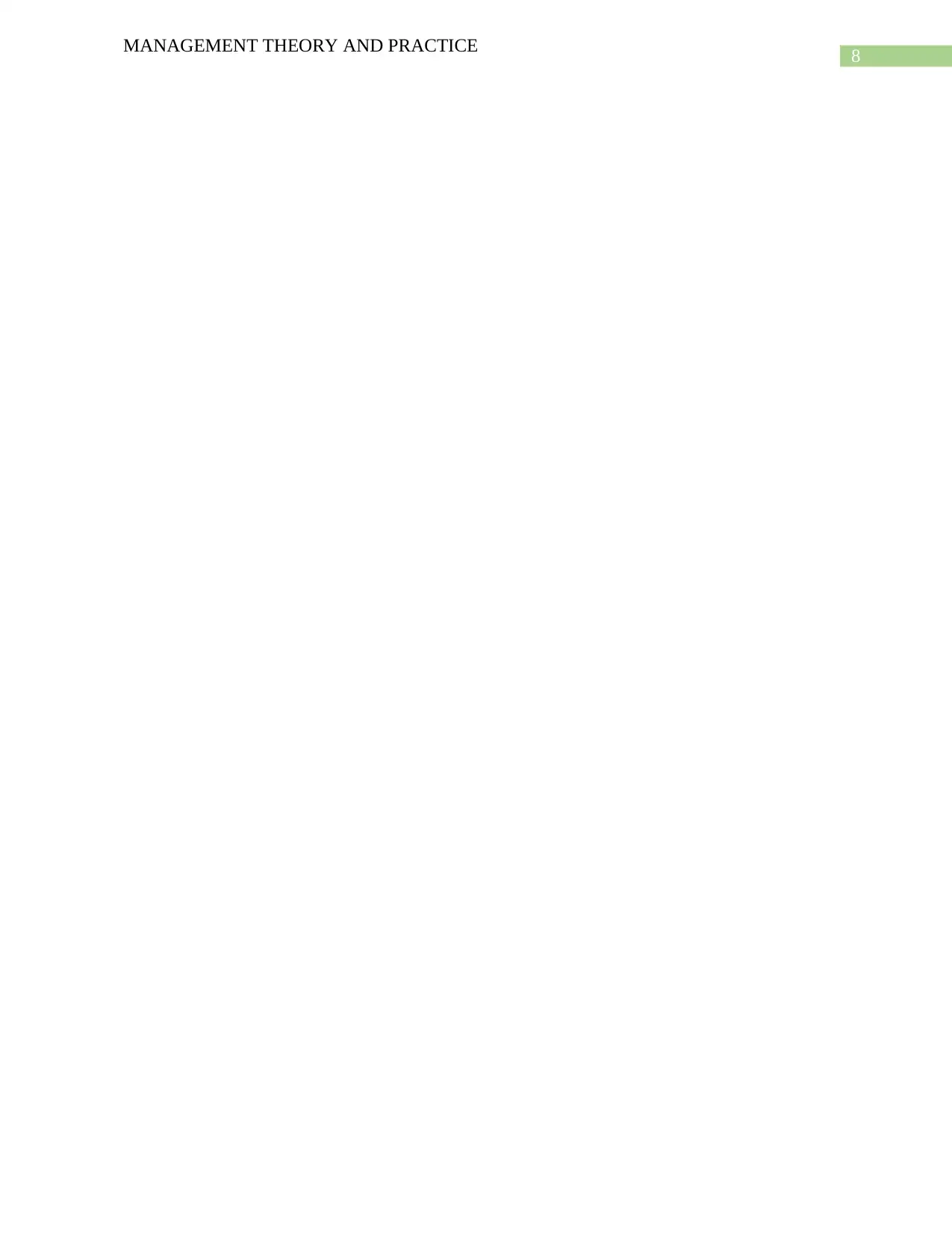
8
MANAGEMENT THEORY AND PRACTICE
MANAGEMENT THEORY AND PRACTICE
⊘ This is a preview!⊘
Do you want full access?
Subscribe today to unlock all pages.

Trusted by 1+ million students worldwide
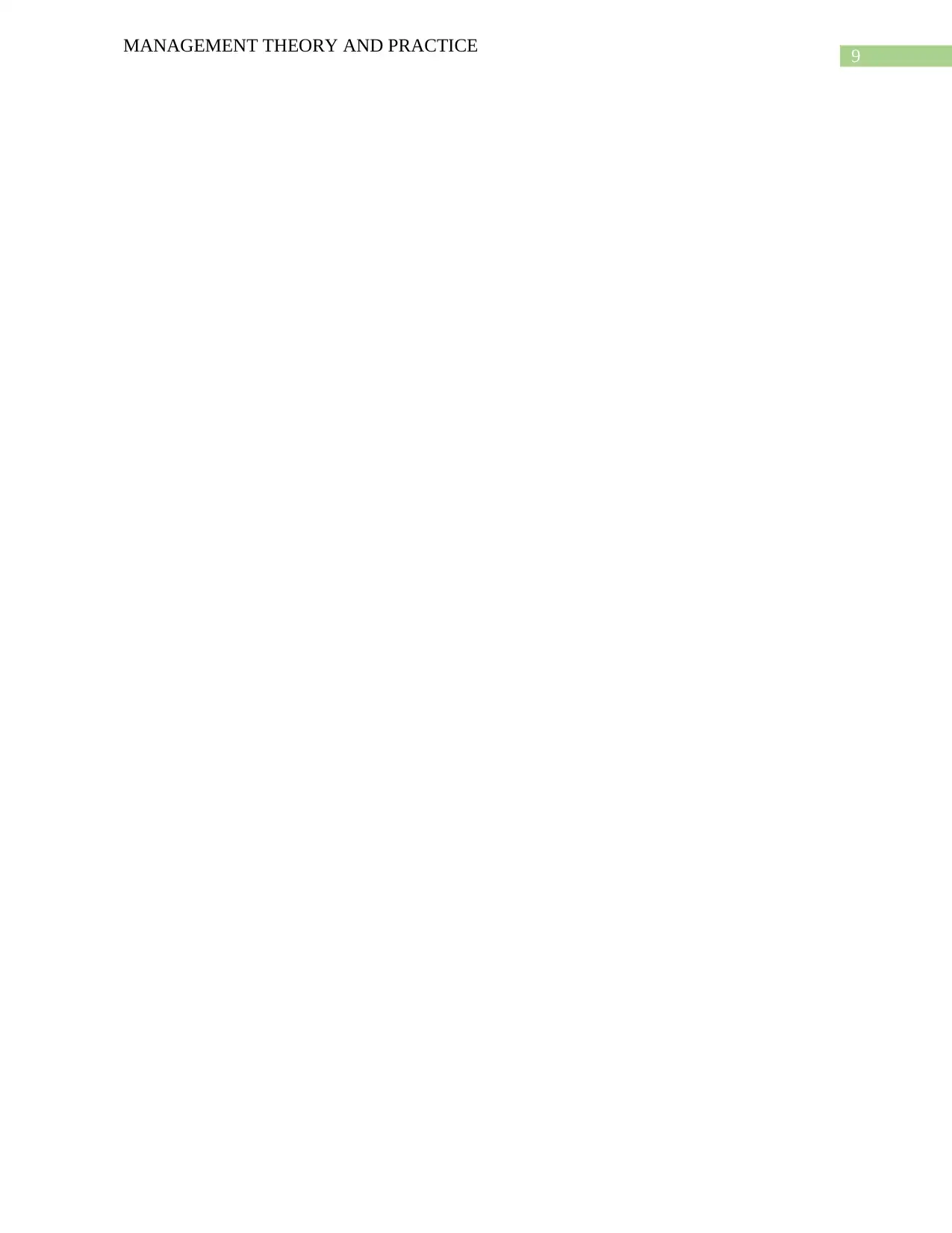
9
MANAGEMENT THEORY AND PRACTICE
MANAGEMENT THEORY AND PRACTICE
1 out of 10
Related Documents
Your All-in-One AI-Powered Toolkit for Academic Success.
+13062052269
info@desklib.com
Available 24*7 on WhatsApp / Email
![[object Object]](/_next/static/media/star-bottom.7253800d.svg)
Unlock your academic potential
Copyright © 2020–2026 A2Z Services. All Rights Reserved. Developed and managed by ZUCOL.





